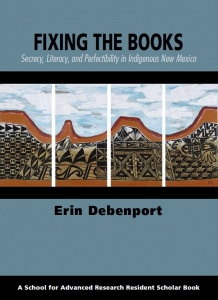Fixing the Books: Secrecy, Literacy, and Perfectibility in Indigenous New MexicoFixing the Books: Secrecy, Literacy, and Perfectibility in Indigenous New Mexico
Biography
In Fixing the Books, professor Erin Debenport presents the research she conducted on an indigenous language literacy effort within a New Mexico Pueblo community, and the potential of that literacy to compromise Pueblo secrecy. She analyzes the decision to produce written materials in a historically oral language and whether that decision is at odds with the linguistically and culturally “conservative” reputation of Southwest tribes, and potentially disrupts the control of both the intra- and intercommunity circulation of cultural knowledge. Debenport concentrates on the role of literacy in the formation of groups and the ways such groups have been connected to political participation, using the case study of San Ramón Pueblo (she uses pseudonyms throughout) as a counterexample to some of the prototypical cases of textual circulation. Looking closely at the texts themselves, she asks how the choices that authors make when crafting indigenous language texts index the larger goals and visions of a community and describes both the formal properties of various types of text, including dictionary example sentences, personal narratives, and pedagogical language dialogues, and the ways these pieces are intertextually linked with other written and oral texts. Debenport concludes that the apparent contradiction surrounding this Pueblo’s literacy effort is actually a reflection of the often unexpected uses of texts that occur in contexts of revitalization and emergent literacy and the multiple language ideologies being indexed and utilized by community members. This ethnographic study of emergent literacy provides a complex picture of secrecy, intellectual property, and the formation of publics through its examination of the relationships between prevailing linguistic ideologies, intertextual connections, and the contexts surrounding the production of indigenous language texts.
ISBN-10: 1938645472
ISBN-13: 978-1938645471


